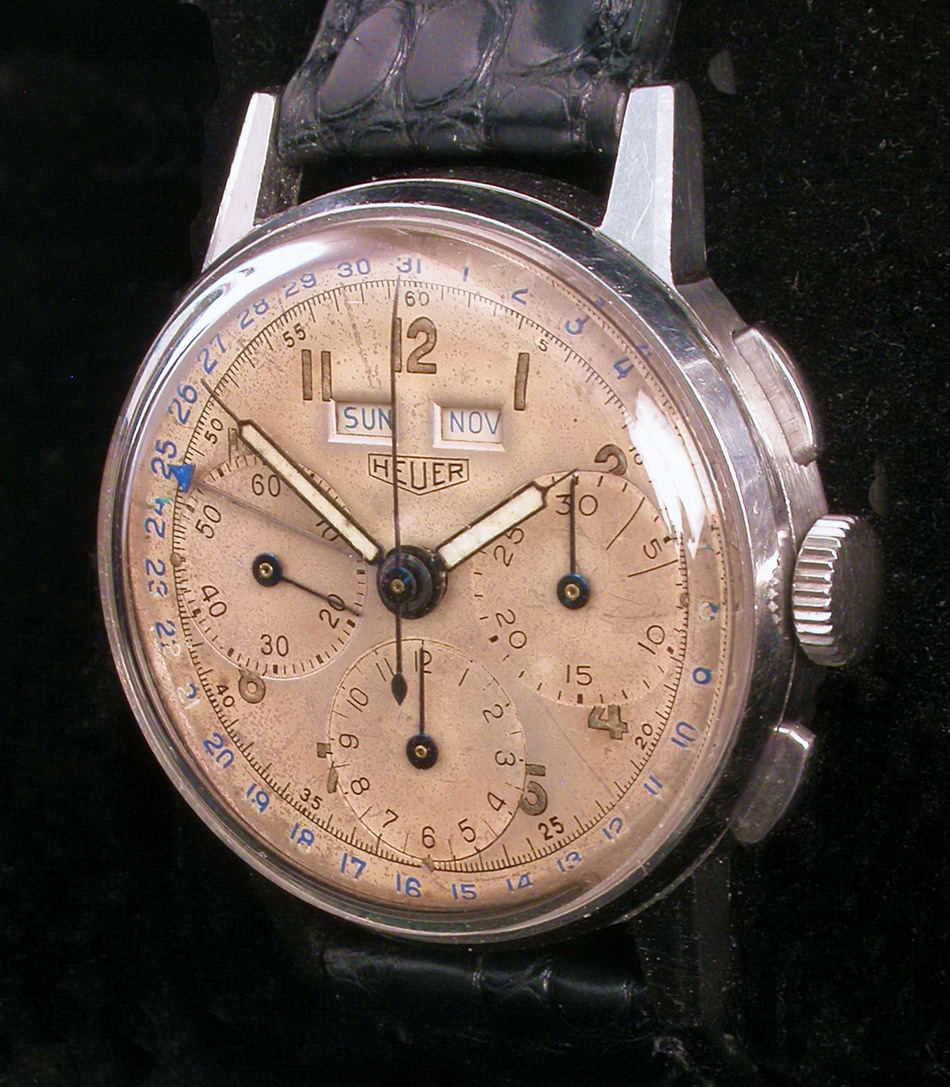| Informational Websites | ChronoMaddox -- the legacy of Chuck Maddox | OnTheDash -- vintage Heuer website | Zowie -- Omega information |
| Discussion Forums | ChronoMaddox Forum | Heuer Forum | Omega Forum |
| Counterfeit Watchers | ChronoTools Forum | ChronoTrader Forum |
|
|
The largest independent, non-commercial, consumer-oriented resource on the Internet for owners, collectors and enthusiasts of fine wristwatches. Online since 1998. | |||||||
|
||||||||
|
||||||||
 |
Vintage Heuer Discussion Forum
The place for discussing 1930-1985 Heuer wristwatches, chronographs and dash-mounted timepieces. Online since May 2003. | ||||||
| |||||||
| |||||||
Heuer Serial Numbers
The whole subject of Heuers and serial numbers is a bit of a mess. We see that some older chronographs have separate serial numbers for the cases and movements; that some chronographs (Caliber 12 models, for example) have serial numbers on the cases, but not the movements; we are told that the serial numbers on various models were used by the case-makers, but not by Heuer, so that Heuer maintained no records tying the case serial numbers to production dates, models, etc. All this leads us to the oft-repeated conclusion that serial numbers on Heuer chronographs are not useful for the purpose of dating a particular watch or for confirming authenticity (in the sense of the case and movement having been together, since they left the factory).
Heuer's serial number situation becomes all the more frustrating for those who collect vintage Heuers, when we see the lovely Rolexes and Omegas (with the dates inside the case-backs and tables of serial numbers, including the years of production); model numbers are also marked on the cases. Frustration turns to anger when we inspect the vintage Seikos and find that -- for a $200 watch -- numbers on the case-back indicate the month of production, as well as the reference numbers for the watch and movement; to add insult to injury (at least for the Heuer collector), the dials of the vintage Seikos are marked with the reference number for the watch and the movement; of course, the reference numbers for the movements are also marked on the movements . . . so when you spend $200 to $800 for your vintage Seiko, you have a reasonable chance of figuring our whether you have a watch that left the factory with its current components or whether someone has been making watches from the parts bin.
But let's get back to the Heuers:
Even though we have authentic Heuer chronographs with no meaningful serial numbers, and cases and movements with no reference numbers at all, I believe that we can derive some worthwhile information from the serial numbers on the movements of certain Heuer chronographs, specifically those from the 1940's and 1950's. Accordingly, I have begun to compile a table / spreadsheet listing serial numbers on the movements of Heuer chronographs from 1940's and 1950's. So far, I have entered approximately 20 serial numbers, and some of the results are interesting (and instructive for collectors evaluating possible purchases):
So What Do We Do Now? The Heuer Serial Number Project!
I would like to enter a few more serial numbers before publishing a first draft of the table. Accordingly, if you have a Heuer chronograph from the 1940's, 50's or early 60's, with a Valjoux movement, and a serial number marked on the movement (main bridge), please send me the following information:
I am not certain exactly how all this information will be stored and presented, but I am confident that it will be useful to Heuer enthusiasts, who are interested in the chronographs from this era. Please post any questions, if it is not clear what we are trying to do with this project.
Thanks for any serial numbers, photos, further information, or suggestions for this project!! This project should be fun . . . let's see where it leads us!!
Jeff


| Chronocentric and zOwie site design and contents (c) Copyright 1998-2005, Derek Ziglar; Copyright 2005-2008, Jeffrey M. Stein. All rights reserved. Use of this web site constitutes acceptance of the terms of use. | CONTACT | TERMS OF USE | TRANSLATE |